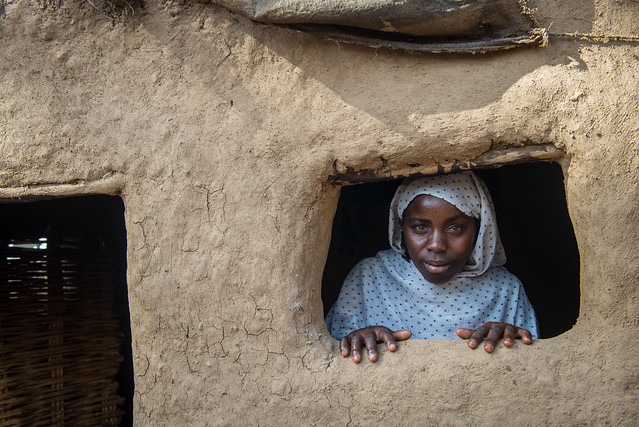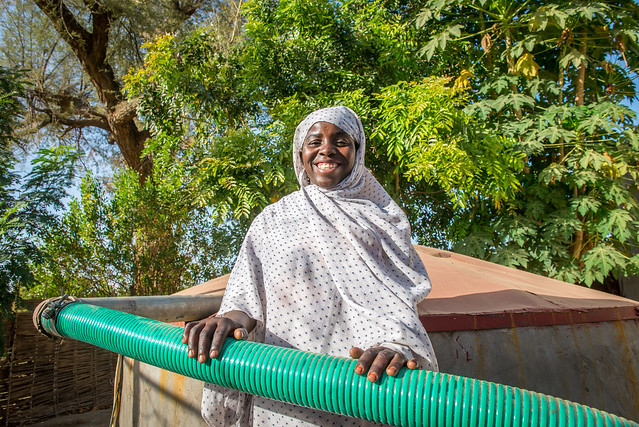The air here in Khamsa Dagaig camp in Darfur’s Central Region, is pungent with the smell of burning charcoal and animal dung. Amina* has lived here for ten years since fleeing her own village when fighting broke out.
She was 16 when she arrived.
“It was October; all of us [villagers] were working hard to bring in the harvest. I was sleeping when I heard our village being attacked,” recalls Amina, her eyes staring steadfastly into the distance.
“I didn’t know who was shooting at us or why, their faces were covered. First they came on camels and horses, then they came in heavy vehicles, and then they came on foot. There was so much screaming, people running, and fire everywhere. I was so afraid I just ran I didn’t even put my shoes on.”

Amina* in Khamsa Dagaig camp in Darfur’s Central Region. Photo: Annie Bungerouth/ACT-Caritas
Many settlements across Darfur have been reduced to rings of ash – burnt and ruined because of the ongoing conflict –those that survive have little choice but to move from rural areas into camps.
This year marks ten years of NCA leading the enormous humanitarian response to the conflict in Darfur. The aid agency has worked through challenging conditions to provide a life-line of essential aid and care through; running health and nutrition clinics, providing clean water and sanitation, running schools, and supporting small-holder farming initiatives.
These vital services reach more than one million people each year, making it one of the largest aid operations on the ground.
The scorching heat of the morning sun beats down as we walk through Dickensian narrow alleys between makeshift houses to collect her daily ration of water. Amina’s two young sons skip in a zig-zag pattern in front of her, calling out to their friends. It’s the highlight of their day collecting water from the area standpipe. She follows leisurely behind them, her white plastic jerry-can swinging back and forth in her hand in rhythm with her footsteps.
The presence of one standpipe in this area of the 20,000-strong camp might not seem like much, but for Amina and her neighbours it represents an amazing achievement.
One of the great successes of NCA’s incredible ten-year, humanitarian programme in Darfur is how together with residents, the organisation brought water to the camp. “When we arrived at this camp water was a big problem” says Amina. “We had to walk to the valley to collect it, and this was dangerous, because we were threatened by nomads who would beat and attack us.
“But we needed to fetch the water for our daily chores, so we had no choice but to leave the camp.”
To meet this clear need, camp residents formed water committees and with the support of NCA came up with an ambitious and life-saving plan of action: they would use modern technology – solar panels – to bring clean safe water to communities.

The presence of one standpipe in this area of the 20,000-strong camp might not seem like much, but for Amina* and her neighbours it represents an amazing achievement. Photo: Annie Bungerouth/ACT-Caritas
A member of one of the camp’s water committees, Amina remembers seven years ago staring down the gaping hole of the newly dug well; she along with other women had come along to the well site with food for the men digging the foundations. Like most of the women and girls in her neighbourhood, she understood how important this project would be to their lives.
The solar panels provide the energy for the pump to draw up water, by using a very small amount of the power produced. Given how the heat of the late morning sun strips the skin from your body, I could well believe that the panels were working overtime, ensuring twenty-nine litres of water for each and every person in the camp.
Amina walks back, this time her jerry-can effortlessly balanced on her head, not a drop spilt, and she’s home safely in less than ten minutes.
It was the best day when we had our own water here in the camp. We still face many challenges after ten years of living here, but at least we don’t need to worry about fetching water.
“Shukran – thank you.”
In the heat and the dust Amina still dares to look into the future and dream of peace.
“I feel sad that my children were born here in the camps, they know nothing of our village, how to farm the land. But when peace finally comes I will be able to return with my sons and show them how to plant seeds into the earth.
“I pray and fast for strength that God will help us change this life, and bring peace.”
* Name changed upon request
